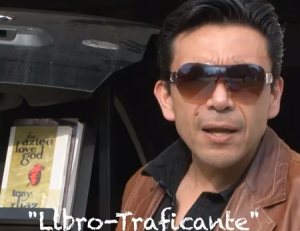“Libro-Traficante” To Smuggle Banned Books To Tucson

As the founder of Nuestra Palabra, Latino Writers Having Their Say, Tony Diaz—along with Bryan Parras, Liana López and a small group of dedicated supporters—has been promoting Latino literature and literacy in Houston for more than 13 years. A weekly radio program on KPFT-FM, workshops, book fairs and readings are common projects. Now, they can add “traficante” to their list. No, they’re not trafficking drugs, but something much more dangerous: books.
Astonished by media reports of ethnic studies books being banned from Tucson public high schools, Parras shared the news with Nuestra Palabra earlier this year. The group knew there was only one reasonable response: smuggle the banned books back into Arizona. And so, the Libro-Traficante Caravan was conceived.
The banned titles include staples of Chicano and Mexican American Studies: Re-Thinking Columbus: The Next 500 Years, Occupied America: A History of Chicanos, 500 Years of Chicano History in Pictures and The Tempest. Yes, William Shakespeare’s play. Shakespeare’s work is often studied in conjunction with the aforementioned titles because of its underlying discussion of colonialism. Nuestra Palabra is currently seeking donations of the banned books and other “dangerous” titles (dubbed “wet books”) to transport to Tucson in a weeklong Libro-Traficante Caravan.
The caravan leaves Houston on March 12, making stops in San Antonio and El Paso before heading into New Mexico. The final stop is Tucson on March 17. In addition to collecting banned books, there will be public readings and performances at select caravan stops. (See librotraficante.com for current information.)
“Arizona perfected ways to make humans illegal and we didn’t do enough to stop that,” Diaz said, referring to the state’s controversial SB 1070. Signed into law in 2010, the legislation targeted the undocumented population, but is largely seen as encouraging racial profiling of Latinos in general and people of Mexican-origin in particular. Alabama followed suit with HB 56, the nation’s harshest anti-immigrant law. But the legislation backfired as Alabama farmers struggled to find laborers from a dwindling pool of workers.
“Now, they want to make ideas illegal,” Diaz said of Tucson’s book ban. The ban is the result of a January vote by the Tucson Unified School District board to eliminate ethnic-studies programs in the city’s high schools. (The courses were deemed illegal under a new state law restricting ethnic-studies classes.) And just to sharpen the point, books commonly used in those courses were not only removed from the classroom, they were boxed up and taken away in an almost theatrical manner in front of students. (See student testimony about books being removed from their classrooms on Censored News and YouTube (see below).
Supporters of the Libro-Traficante Caravan include writers such as Sandra Cisneros, Dagoberto Gilb and performance artist Guillermo Gomez-Peña. Gomez-Peña has expressed interest in riding in the caravan, which will certainly bring another level of theatricality to the Libro-Traficante, which is already using a thick dollop of satirical humor to build support (as in their Kickstarter fundraising video).
“Nuestra Palabra has been involved in cultural causes for 13 years now. And you know what? Logic doesn’t work, said Diaz. “We’ve had professors and other experts come and share their very logical analyses of a situation, and it hasn’t worked. So, if logos isn’t working we must resort to pathos.”
[Screenshot nd Video By hightechaztec]


